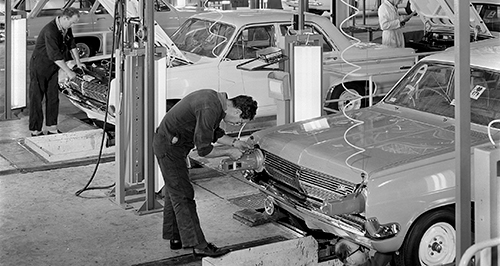News - HoldenResearchers seek former Holden workers’ storiesBack then: Holden workers at the company’s Elizabeth assembly plant in Adelaide on the final day of production, October 20, 2017. Oral history project to tell GMH’s manufacturing story from 1945-2017, warts and all26 Sep 2019 By TERRY MARTIN FORMER Holden factory employees are being sought by researchers from Monash University and the University of Adelaide for interviews that will form the basis of an oral history project on the company’s post-WWII car manufacturing era.
The research team said anyone who has worked at any of Holden’s production facilities, including Woodville and Elizabeth in Adelaide, and Dandenong and Fishermens Bend in Melbourne, is eligible to be interviewed as part of the project, which focuses on workers rather than the vehicles.
A broad range of experiences, including from employees who spent only a short period with the company and who might have left on poor terms, are being sought in an attempt to provide a complete picture of the impact of Holden’s operations on its workforce, particularly from 1945 until the final car rolled off the production line at Elizabeth on October 20, 2017.
At this stage, the researchers plan to interview 100 former employees who performed a variety of roles in Holden’s factories during this period, which will then be used to produce written histories and exhibitions.
They will be archived at the National Library of Australia in Canberra and, subject to any conditions imposed by the interviewees, made available for future researchers and members of the public.
Associate professor Paul Sendziuk from the University of Adelaide’s School of Humanities said: “Whereas most histories of Holden – and histories of automotive manufacturing in general – focus on the mercurial careers of senior executives and the cars, this project puts manufacturing workers and places at the centre of the story.
“South Australia’s largest private employer for much of its lifespan, and the linchpin of the state’s manufacturing sector, Holden’s final factory closure evoked grave concern for its workers and the hundreds of smaller component manufacturers and local businesses that figuratively and literally fed its factory and workforce.
“The role that workers, and the working-class communities in which they lived, played in Holden’s business warrants thorough investigation, as does the effectiveness of the company’s attempts to help its workforce transition to new jobs.”
Professor Alistair Thomson from the history program at Monash University added that “although Melbourne’s GMH plants at Fishermens Bend and Dandenong closed much earlier than the South Australian plants, working for Holden is still a powerful memory for many former Victorian Holden workers, perhaps especially in Melbourne’s southeast, where residential suburbs created in the 1950s and ’60s catered for Holden families”.
“Holden’s history also illuminates the impact of post-war migration upon Australian workplaces and suburbs,” he said.
The research team said it particularly wants to understand and preserve memories about: what it was like to work in Holden’s factories; the different jobs people did and how they contributed to the final product; working conditions; how technological change affected the nature of work; how work life impacted on family and social life; social and sporting groups or clubs associated with Holden; rivalries with other manufacturers, such as Ford; Holden’s participation in motor racing; how workers coped with difficult moments such as industrial unrest, layoffs and plant closures; migrant workers; female factory workers; living and working in communities near the factories; workplace and motoring safety; and closure of Holden’s manufacturing operations.
Former workers with stories to share are urged to contact the researchers via the project website, www.ua.edu.au/holdenhistory.
Holden is providing funding for the project, along with the Australia Research Council, the National Library and the National Motor Museum.
Meanwhile, Toyota has launched what it is calling a “year-long social history project” that commemorates 60 years of operations in Australia.
This year marks the 60th anniversary of the first official imports of Toyota vehicles into Australia by Thiess Toyota.
Over the next 12 months, the company will use social and other media to “tell the stories of the pioneers, the innovators, the adventurers, the communities and everyday Australians that built post-war Australia into what it is today – with a helping hand from Toyota”.  Read more20th of October 2017  Holden exit: Bernhard thanks employeesHolden boss pays respects to retrenched Holden manufacturing workers at Elizabeth20th of October 2017  Holden exit: Production finally ends after 69 yearsEnd of an era as Holden shuts Elizabeth plant and Australian car manufacturing ends14th of October 2017  Holden exit: Tracing 161 years of mobilityAustralia’s own car-maker fades to black after 16 decades of Holden manufacturing14th of October 2017  Holden exit: Last Commodores ‘the best’Elizabeth tops GM plants for quality as Holden goes out with head held high |
Click to shareHolden articlesResearch Holden Motor industry news |
















Facebook Twitter Instagram